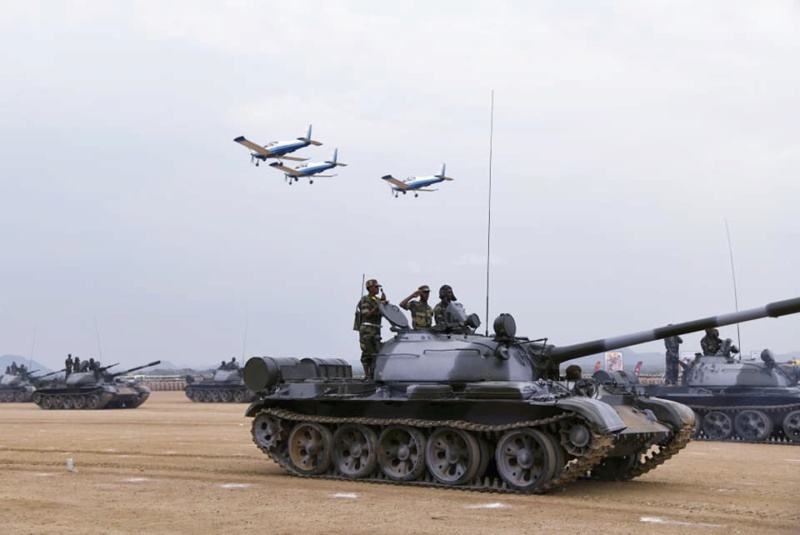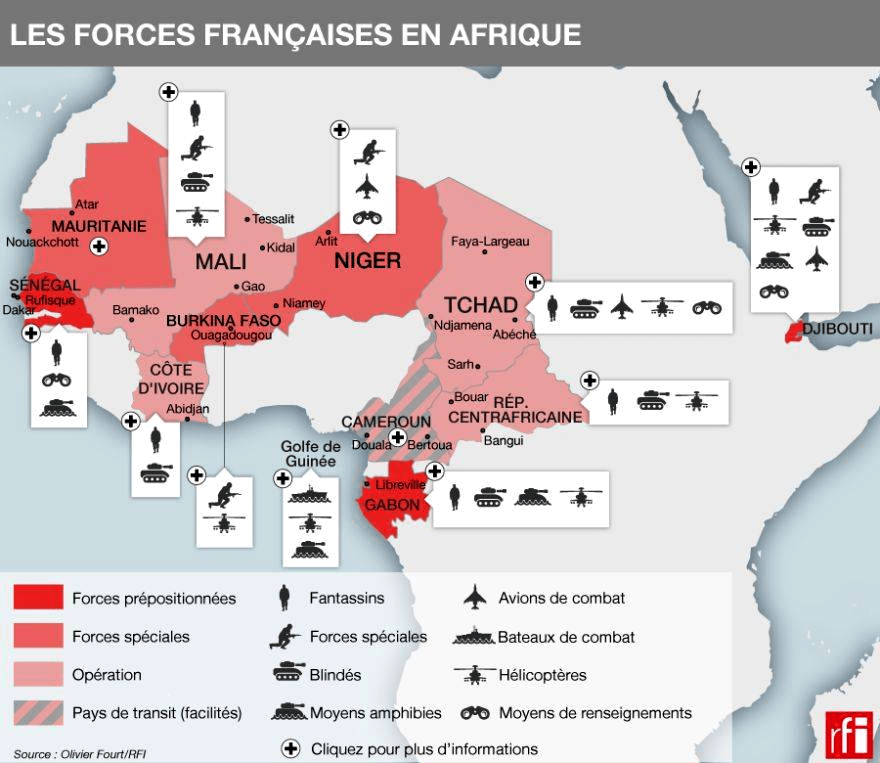Africans again humiliated Macron and France, by Valeria Verbinina for VZGLYAD. 08.30.2023.
Jean-Luc Mélenchon: Supporting the deposed President of Gabon, Macron compromised France.
This is the sixth country in Africa that has experienced a military coup in the past three years - and this time, Gabon has become such a country. “Macron has once again compromised France,” writes the head of the French left, Jean-Luc Mélenchon. Indeed, the actions of Paris and Western policy in general led to the fact that France was in Gabon in an extremely unenviable position.
Gabon, unexpectedly for everyone, became the scene of another military coup in Africa. The fact that the experienced politician Ali Bongo was re-elected for a new term not so long ago gives a special piquancy to what is happening. "Just a few minutes separate the announcement of the victory of the incumbent Ali Bongo Ondimba this Wednesday, August 30 ... and the televised address of the military, who said they have seized power," Le Figaro reported, which also called Bongo a "controversial heir".
Outwardly observing all democratic procedures, he actually established dynastic rule, coming to power after his father Omar Bongo, who ruled the country from 1967 to 2009. Having secured the place of the head of state, Ali Bongo jealously ensured that no one bypassed him. Literally the day before, the head of the Gabonese Central Election Commission, Michel Stefan Bonda, announced that Ali Bongo was triumphantly re-elected for a third term, receiving 64.27% of the vote, and in general everything is fine, democratic and completely legal.
Nevertheless, Western experts had reason to doubt Bongo's victory. International observers were not allowed to participate in the elections, and, moreover, there were reasons to believe that the counting of votes was, let's say, not very correct. For greater democracy, the Gabonese authorities turned off the Internet during the elections - allegedly in order to combat unwanted rumors and calls for violence - and some foreign TV channels, and also introduced a curfew.
Gabon is considered one of the richest countries in Africa - another thing is that, apparently, a few can take advantage of this wealth, since a third of the population is below the poverty line. The main source of income is oil, which accounts for 70.5% of exports and 38.5% of GDP. Of great importance are the vast Gabonese forests, which are considered the "second lung of the planet" after the Amazon forests.
And now, after Bongo secured his third term and probably even managed to celebrate him in the circle of those close to him, suddenly such a surprise! The country's own military, including the presidential guard in green berets, unceremoniously ousted the country's president and announced on television that the "rigged elections" had been cancelled.
It is curious what words were chosen to address the people and the international community. Ali Bongo's government was called "irresponsible and unpredictable", accused of "leading the country to chaos", and ended, as usual, with the words that "we decided to protect the world by putting an end to the current regime." It is also interesting that the Internet has been turned back on in Gabon. As for the ousted President Ali Bongo, he was reportedly taken into custody at his residence. His son and several close associates were arrested, who have already been charged with "high treason."
The French edition of Le Monde contacted the head of the putschists, General Nguema, and asked him a few questions.
"Do you consider yourself the new head of the Gabonese state?"
“At the moment I don’t count anything,” the interlocutor replied. “We will discuss this with other generals.”
“Was the coup long in the making, or were you spurred into action by the announcement of the results of the vote that Bongo had won?”
“You know, there are many dissatisfied people in Gabon, and, besides this, one should not forget about the illness of the head of state (Ali Bongo suffered a stroke in 2018). Everyone talks about it, but no one wants to take responsibility. He did not have the right to go to the polls for the third time, they simply wiped their feet on the constitution ... And the army decided to intervene, take responsibility.”
"What fate awaits Ali Bongo?" “It was the head of state. He was sent into retirement. He has a right to it."
On Monday, French President Emmanuel Macron complained about the "epidemic" of military coups in former French colonies in Africa. Not so long ago, it was mainly about Niger, the loss of influence in which the French regard painfully, since the country was one of the main suppliers of uranium for French nuclear power plants.
On Niger, the countries of the ECOWAS bloc, which protects Western interests, have imposed a tough policy of sanctions - up to and including power outages, which should hit an already undistinguished population - and are openly threatening to intervene. Apparently, it is planned to worsen the life of the local population to such an extent that they will gladly accept any changes from the outside, if only not to suffer further. However, they did not have time to solve the problem with Niger, as the epidemic of military coups spread to Gabon.
The head of the French left, Jean-Luc Mélenchon, spoke out on social networks about what was happening most harshly: “Gabon was able to get rid of its puppet president only with the help of the military ... Macron again compromised France, supporting the one who should not be supported to the end. Africans have turned the page."
In general, Western experts found themselves in an uncomfortable position: on the one hand, no one had any illusions about the ruling regime, and journalists openly criticized Bongo and his methods in the media. On the other hand, no one has canceled the rule “son of a bitch, but our son of a bitch” in politics, especially since all the changes in Africa from the point of view of the West are exclusively for the worse.
When the West starts whining about the trampled democracy in yet another country, stamping its feet and threatening the new government, it is then terribly surprised by the fact that the new government is sending it far, far away and looking for partners - including business partners - in countries that do not threaten and who are ready to build a dialogue with an open mind. And first of all, we are always talking about a country that the West perceives as its sworn enemy - that is, about Russia.
So when after the 2016 elections riots broke out in Gabon and Bongo's main rival, Jean Ping, announced that the election results had been rigged and tried to appoint himself president, the West sighed but swallowed what was happening. And now, when Ali Bongo, convenient for many, has been thrown off, the prospects are by no means bright. And, for example, the French company "Eramet" has already been forced to suspend its activities in Gabon. Eramet mines the strategic metal manganese and also maintains a key railway line in Gabon.
It is not surprising that France has already condemned the military coup, and Ali Bongo managed to record a video in which he calls on the world community for help. It is also not surprising that in the capital of Gabon, Libreville, people take to the streets and shout: “Down with Bongo!” Others directly demand that the head of the coup, General Bris Oligi Nguema, be proclaimed head of the country: "Oligi for president!"
The French have already calculated that in three years six African countries - Mali, Guinea, Sudan, Burkina Faso, Niger and now Gabon - have been the victims of military coups, and in other countries coups have occurred several times.
Former French President Francois Hollande noted that the “lack of a clear reaction, including from France, starting from the moment when the very first coup happened in Mali ... There is something like acceptance of what happened, and therefore the military took courage,” said He.
If Hollande meant by "clear reaction" actions like the assassination of Gaddafi in Libya, in which France took an active part, then it should be said that the removal of Gaddafi brought down the entire security structure in northern Africa and led to such consequences that have not yet been resolved since. Moreover, no one was held responsible for the elimination of the leader of the state, and one can bet that they never will.
But it is clear that France is hurt by its colonial past, and one really wants to give the impression of a force to be reckoned with. Especially when some Libyans somewhere far away will pay the bills. Or residents of Niger, or maybe Gabon. Manganese, of course, is not uranium, but I don't want to lose it either.
Therefore, France will demand to return Bongo to his place, despite all the claims against him. He studied in Paris, was elected almost legally, his man, in a word. And, of course, France, in case of refusal, will impose sanctions, where without them. And then, once again, he will wonder why everyone in Africa can’t stand her and don’t want to have any more business with her.
https://vz.ru/world/2023/8/30/1228153.html












 lyle6
lyle6




